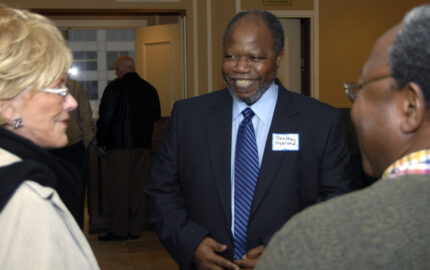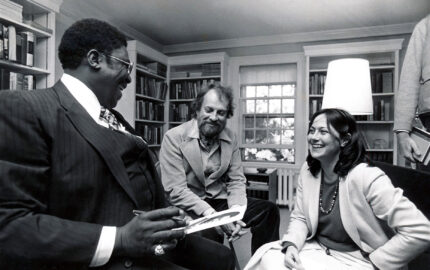On December 5, 2005, the news that 80-year-old Liu Binyan, a 1989 Nieman Fellow, had passed away saddened Chinese, both in China and abroad. Numerous condolence letters and memorial articles praising Liu as "China's conscience" were sent to his family and the news media.
Liu Binyan made unparalleled contributions to the profession of journalism on mainland China. As a reporter for China Youth Daily, in 1956 he penned a number of articles insisting that the role of the journalist was to serve as a watchdog of society. Among his many articles, "The Inside Story of Our Newspaper" denounced press censorship, and "On the Bridge Construction Site" exposed the dark side of life under the Communist regime.
By 1957 Liu was labeled a "rightist" and was expelled from the Communist Party. It took 20 years before he was rehabilitated. He later recalled, "As a rightist, at the bottom of society, I learned about the true reality of Communist life."
After his "rightist" label was removed, in 1985 Liu became a reporter for the People's Daily, the mouthpiece of the Chinese Communist Party. Liu's articles once again targeted social wrongs, corruption and oppression. Two of his most famous works are "People or Monsters," which describes a case of rampant corruption in northeast China, and "A Second Kind of Loyalty," suggesting there are higher values than obedience to authority. He also became a vice chairman of the China Writers' Association. His many readers, the ordinary people in China, called him a "qingtian," an historical term referring to someone to whom the people can turn to seek justice. He became a role model for journalists in reform China, encouraging them to take risks to defend the weak and oppressed.
Because of his significant influence, Liu Binyan once again was targeted by the authorities. In 1987, during the antibourgeois liberalization movement that attacked liberal intellectuals, paramount leader Deng Xiaoping expelled Liu from the party and banned his writings.
In 1988, Liu Binyan won a Nieman Fellowship and traveled to the United States. The next year, 1989, when the Chinese government cracked down on the democracy movement, Liu bravely and openly condemned the slaughter in Beijing. As a result, his name appeared on the Chinese government blacklist, and he was not allowed to return to China.
In exile, Liu Binyan continued his work as a journalist. In 1990, he was elected chairman of the board of the exiled newspaper Press Freedom Herald. From 1992 to 1999, he published a monthly English-language newsletter, China Focus, and from 1993 to 1996 he also published a Chinese-language monthly, The Road. In 2002 he cooperated with other independent writers to establish the Chinese Pen Association, to which he was elected the first president. To the very end of his life, he remained committed to exposing the injustices in Chinese society.
In September 2002, when he was diagnosed with cancer, he hoped to spend his final years in his motherland. However, worried about his great social influence, the Chinese authorities never replied to any of his requests to return home.
On February 27, 2005, hundreds of journalists, writers and friends came from all over the world to attend Liu Binyan's 80th birthday gathering held in Princeton, New Jersey. As a token of their respect, they constructed a personal homepage, "Liu Binyan" and published a collection of articles entitled Eternal Exiles. An artist also made a bronze statue in his honor. On December 17, 2005, a memorial service was held in Liu Binyan's memory at Princeton University. A moment of silence was held for this "great citizen of China, distinguished writer, iron-willed journalist, guardian of truth, and indefatigable advocate and friend of the downtrodden and the aggrieved." Among the many eulogies, a young journalist in China said that Liu Binyan had enlightened his entire generation and had encouraged him to become a journalist. Another memorial lamented that Liu Binyan had departed just when the poor and oppressed in China need him the most. Despite the ban on his works, Peking University selected his works as exemplary writings from the last century. Liu Binyan's wife, Zhu Hong, said that Liu Binyan's wishes for his own epitaph were that it would read: "Here lies a Chinese person who did some things that it was right for him to do, and said some things that were right that a person say." She has said that his family members will bring him home.
Juntao Wang, a 1996 Nieman Fellow, is a PhD student in political science at Columbia University. Xiaoping Chen, a 1998 Nieman Fellow, is a student in the Doctor of Juridical Science program at the University of Wisconsin Law School.
Liu Binyan made unparalleled contributions to the profession of journalism on mainland China. As a reporter for China Youth Daily, in 1956 he penned a number of articles insisting that the role of the journalist was to serve as a watchdog of society. Among his many articles, "The Inside Story of Our Newspaper" denounced press censorship, and "On the Bridge Construction Site" exposed the dark side of life under the Communist regime.
By 1957 Liu was labeled a "rightist" and was expelled from the Communist Party. It took 20 years before he was rehabilitated. He later recalled, "As a rightist, at the bottom of society, I learned about the true reality of Communist life."
After his "rightist" label was removed, in 1985 Liu became a reporter for the People's Daily, the mouthpiece of the Chinese Communist Party. Liu's articles once again targeted social wrongs, corruption and oppression. Two of his most famous works are "People or Monsters," which describes a case of rampant corruption in northeast China, and "A Second Kind of Loyalty," suggesting there are higher values than obedience to authority. He also became a vice chairman of the China Writers' Association. His many readers, the ordinary people in China, called him a "qingtian," an historical term referring to someone to whom the people can turn to seek justice. He became a role model for journalists in reform China, encouraging them to take risks to defend the weak and oppressed.
Because of his significant influence, Liu Binyan once again was targeted by the authorities. In 1987, during the antibourgeois liberalization movement that attacked liberal intellectuals, paramount leader Deng Xiaoping expelled Liu from the party and banned his writings.
In 1988, Liu Binyan won a Nieman Fellowship and traveled to the United States. The next year, 1989, when the Chinese government cracked down on the democracy movement, Liu bravely and openly condemned the slaughter in Beijing. As a result, his name appeared on the Chinese government blacklist, and he was not allowed to return to China.
In exile, Liu Binyan continued his work as a journalist. In 1990, he was elected chairman of the board of the exiled newspaper Press Freedom Herald. From 1992 to 1999, he published a monthly English-language newsletter, China Focus, and from 1993 to 1996 he also published a Chinese-language monthly, The Road. In 2002 he cooperated with other independent writers to establish the Chinese Pen Association, to which he was elected the first president. To the very end of his life, he remained committed to exposing the injustices in Chinese society.
In September 2002, when he was diagnosed with cancer, he hoped to spend his final years in his motherland. However, worried about his great social influence, the Chinese authorities never replied to any of his requests to return home.
On February 27, 2005, hundreds of journalists, writers and friends came from all over the world to attend Liu Binyan's 80th birthday gathering held in Princeton, New Jersey. As a token of their respect, they constructed a personal homepage, "Liu Binyan" and published a collection of articles entitled Eternal Exiles. An artist also made a bronze statue in his honor. On December 17, 2005, a memorial service was held in Liu Binyan's memory at Princeton University. A moment of silence was held for this "great citizen of China, distinguished writer, iron-willed journalist, guardian of truth, and indefatigable advocate and friend of the downtrodden and the aggrieved." Among the many eulogies, a young journalist in China said that Liu Binyan had enlightened his entire generation and had encouraged him to become a journalist. Another memorial lamented that Liu Binyan had departed just when the poor and oppressed in China need him the most. Despite the ban on his works, Peking University selected his works as exemplary writings from the last century. Liu Binyan's wife, Zhu Hong, said that Liu Binyan's wishes for his own epitaph were that it would read: "Here lies a Chinese person who did some things that it was right for him to do, and said some things that were right that a person say." She has said that his family members will bring him home.
Juntao Wang, a 1996 Nieman Fellow, is a PhD student in political science at Columbia University. Xiaoping Chen, a 1998 Nieman Fellow, is a student in the Doctor of Juridical Science program at the University of Wisconsin Law School.



